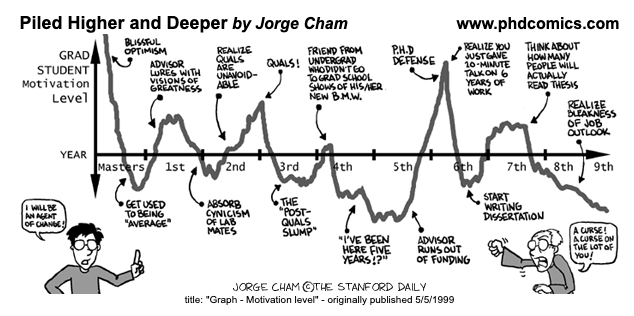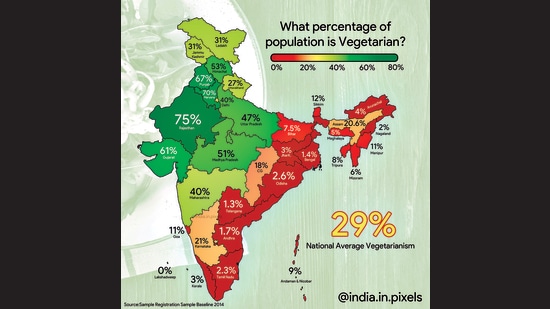
A question that often comes up in conversation with friends, the kids of friends, our kids, my family, and, even, between my wife and me is “Were the years in grad school, working towards a PhD, worth it?”
Speaking for myself, the answer is crystal clear: Absolutely. I would do it again, in a heartbeat.
But then, what is good for me might not be good for everyone else. So, I thought that I would take some time to articulate a framework a reader might use to make this determination for herself. Here are the key dimensions, in no particular order. But starting with the most critical one: Motivation.
Topic 1: Why pursue a PhD? What does it buy you? It gives you the superpower ability to solve most any problem, in any area that you choose to put your head to. Crazily empowering.
The PhD is, at its most basic level, an exercise in systematically identifying, studying, experimenting, and solving hard, sophisticated, complex (and, in the sciences, technical) problems. Starting out knowing nothing and emerging as an expert when done.
Once done with the PhD, you have a superpower: To take on most any problem, from one in a proximal space to one you have never previously studied, and solve it. To present the output of the rigorous process and solution for the world to scrutinize and agree/disagree with you. To let you make decisions and act appropriately.
Question to ask yourself: Do I care/need to build this skill?
Topic 2: Is the PhD, a very different kind of degree, for you? Your temperament has to align with the journey.
The PhD is fundamentally a very different kind of degree. It’s something most people don’t really understand—till they actually go through the process.
At its core is the research that you have to execute, from identifying the problem through convincing the academic world around you that the problem is an interesting/important one to demonstrating that you have a wonderful and unique solution to it to, ultimately, defending it and consequently moving the scientific body of knowledge forward. This is the very essence of why the PhD is hard. Why it is a lonely journey. And, why it is so unpredictable.
When I see former PhD students list “PhD (ABD)” (= PhD (all but dissertation)), I am reminded of this fundamental difference. If you have a BS and an MS, I am pretty confident that you will clear all of the exams that one requires to get to the dissertation phase. But, that is just to get to the starting point. It doesn’t guarantee that you are capable of the problem framing and solving exercise that gets you the research experience to complete the degree. That shows that you are comfortable navigating the intrinsic ambiguity associated with exploring new territories. That you have the grit to make your way through three to five cycles of this exercise so you have, at the end, the compelling evidence that your thesis committee walks away believing that you are an independent thinker, worthy of a PhD.
The dissertation process is what makes this so different.
Question to ask yourself: Do I have what it takes to make this rather arduous and lonely journey, with all of the vicissitudes of research and personal life thrown in?
Topic 3: Does the field that fascinates me need this degree to differentiate myself? In some cases, it is a necessity to rise.
Depending on whether you want to be an engineer, a lawyer, a doctor or a scientist of any shade (e.g., mathematician/physicist/Biologist), the PhD ranges from helpful to harmful. From a necessity if you are ambitious to a waste of time.
The test, quite simply, is
- Does the profession need a deep understanding of the underpinnings?
- Does career progress in that field need the credentials?
In the biotech space, which I see through the eyes of my wife, Surekha, it is clear that developing a deep understanding of and the intuition around the science in order to set up the experiments and interpret the results correctly requires solid training. And, getting a PhD is critical. On the other hand, as I look at an area like marketing, I’d say that for most people a PhD is a waste of time. That said, there are a few areas which display bimodal behaviors. Computer science being one of them. For most CS jobs, one can argue that even an undergrad is a waste of time; a PhD a total waste of time. However, there are a few jobs—where conceptual problems are addressed and the big directional moves are made—that do need a PhD. Think of the Jeff Dean’s and Pandu Nayak’s at Google or the Yann LeCun’s at Facebook.
Question to ask yourself: What am I aspiring to professionally?
(I recognize that many youngsters look at CS as an area in which even a mediocre developer has a job for life since supply trails demand by a long margin. They look at the pay as a way to support other interests.)
Topic 4: Is the opportunity cost worth it? In the sciences, it is often the price of entry. Across the board, the real value is in the career options it creates.
A common concern is lost time and income. So, let’s the do math
- Assumptions
- Assume a PhD tenure of 5 years
- Assume a stipend of $50k/yr for the PhD student and an all in salary of $125k for an engineer (higher for CS, I am told)
- Ignore raises etc
- Assume that this is in the STEM area, not in history or a similar area
- So, the differential is $375k (= ($125k – $50k)/yr * 5yrs)
- You pay this back by
- Getting paid better than your contemporaries who did not go to grad school thanks to your unique, deep skills (from year 6 on)
- Getting to higher positions that they could never aspire to
- Getting to these higher positions quicker
- But, far far more important is the value of the options that a PhD creates for you
- Your ability to think conceptually, to problem solve, to communicate clearly, to dig into and learn about areas you don’t know much about open doors for you
- These doors throw your career into hyper mode. From Andy Grove to Eric Schmidt.
- And, it will let you be recognized in ways others will never be able to be.
Question to ask yourself: All this said, the real question is how comfortable are you living a totally broke lifestyle for the 5 years while your friends are enjoying the money that they are making upon graduating? When they buy new cars, go on ski trips, travel overseas on holiday, find and spend time with their boy/girl friends? And, in striking contrast, you are barely making ends meet, driving a clunker, worrying whether your PhD will see the light of day.
Topic 5: What kind of advisor do I want to work with? Again, depends on your temperament and the level of independence you seek, today and tomorrow.
There are, broadly speaking, two kinds of advisors.
- The first gives you homework problems and has you solve them
- They have done the distillation for you.
- You solve 4 of them and you have the 4 chapters in your thesis.
- An extension of your BS and MS programs.
- Since they are problems your advisor came up with, you have serious tailwinds that see you through more predictably and quickly
- The second gives you a home, freedom, and the opportunity to grow. Or, put differently, leaves you to your wits, forcing you to sort the world out on your own
- You have to do the distillation
- You have to formulate and solve, get lost, meander, despair, and come back with something tangible
- You have to convince everyone, starting with your advisor
- You will see many fall seasons come and go…
My sense, when I look back over time, is that the latter, while far more frustrating in the moment, trains you far better for the rest of your life.
Question to ask yourself: What is the experience that I want? How much short term pain am I willing to tolerate for the longer term benefits of being independent and self-driven?
Some fun threads. Aka, what to be prepared for
- Groundbreaking work
- While every PhD starts out wanting to do groundbreaking work, the odds are that your PhD will not be one.
- This comic from Jorge Cham, who also worked with my advisor long after I had graduated, lays it out beautifully
- Advisor-Advisee relationship
- The PhD is sort of like an apprenticeship of yesteryears—your advisor is your sherpa, starting out by showing you the ropes and becoming your cheerleader (ideally!) by the end when you are leading him/her along. This is a five-ish year journey.
Additionally, and certainly in the US, your advisor is your boss. Your advisor has likely raised some funding against a commitment. And, is hiring you to help make progress. The implication of this is that, unless you are lucky to have independent funding, the kinds of problems you solve are predetermined.
The pressure of this delivery (afterall, your advisor needs to raise money for the next grad student coming after you… So, if you dont deliver, she cant. And, if she cant, her academic career is at risk.
- You don’t know how long the journey will be. Or, sadly, if you will ever get done.
- And, you will get asked this by your parents, your significant other, your SO’s parents, and, for that matter, by everyone you ever meet.
- Again, borrowing from Jorge.
- Get used to answering this question!
In closing:
Pick a path that makes sense to you. If it isn’t turning out right, quit quickly and boldly. But, almost always, the grit and patience you bring will turn up outsized results for you.
PS: My own journey was a rich, rewarding, and rough one. I thank my parents, siblings (especially my sister), spouse, friends, and advisor for helping me make it through while keeping my sanity and interests in life intact!
| My father, Prof. A K Rao, when he got his PhD at the Imperial College in 1958 | Me, when I got mine at Stanford in 1992 (with Prof. Mark Cutkosky, my advisor) |









